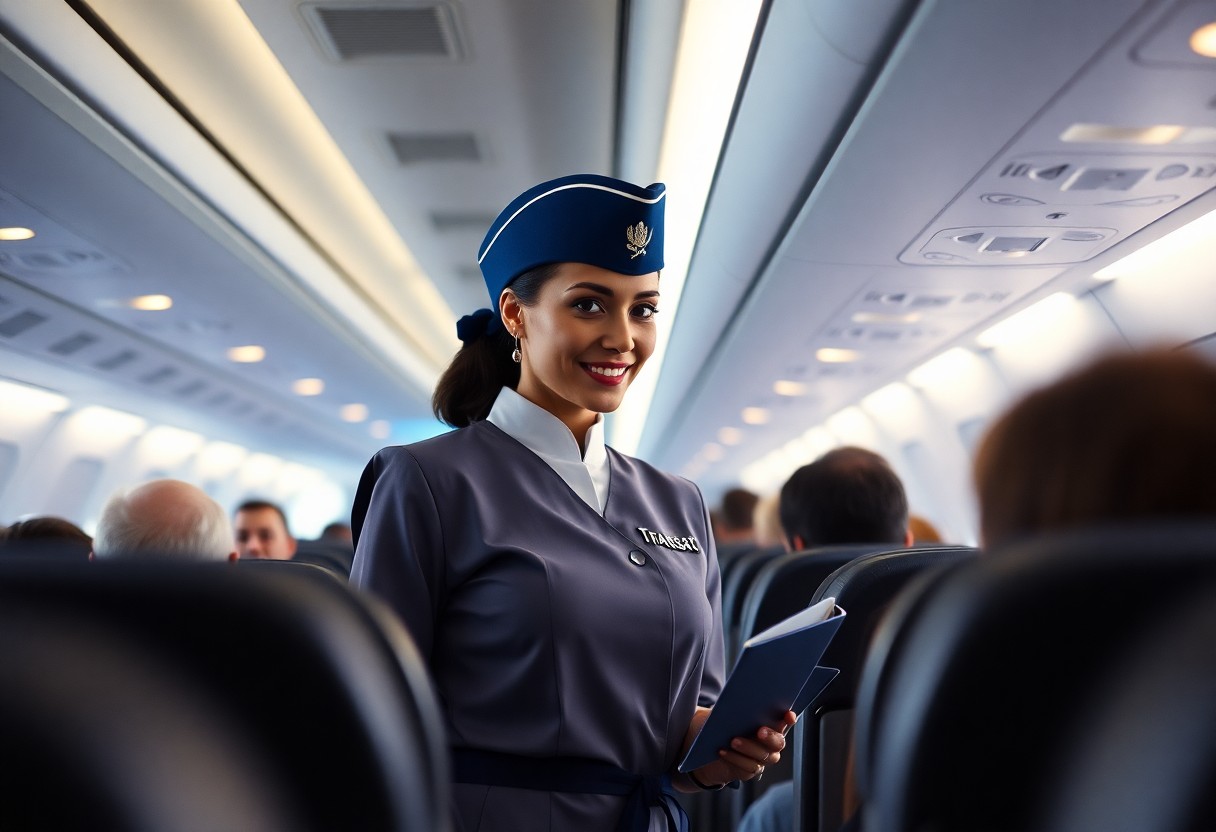Most travelers appreciate the dedicated professionals who ensure a safe and enjoyable flight experience. As you step aboard an Air Transat aircraft, the cabin crew plays a vital role in delivering exceptional service, from safety demonstrations to in-flight assistance. Understanding the responsibilities and training of Air Transat’s cabin crew can enhance your appreciation for their work and contribute to a more pleasant journey. In this post, we will probe into the various aspects of the cabin crew’s role, highlighting what you can expect during your journey with Air Transat.
Key Takeaways:
- Air Transat cabin crew prioritize passenger safety and comfort, ensuring a high standard of service throughout the flight.
- The cabin crew undergoes comprehensive training, including emergency response procedures and customer service skills, to handle various in-flight situations effectively.
- Air Transat promotes a collaborative team environment among its cabin crew, fostering communication and support to enhance the overall travel experience for passengers.
Role and Responsibilities of Air Transat Cabin Crew
While flying with Air Transat, you will encounter cabin crew members who play an imperative role in ensuring your journey is safe and enjoyable. Their responsibilities encompass a wide variety of tasks, from attending to passenger needs to adhering to safety protocols. You can expect them to provide assistance, serve meals, and ensure that your travel experience is both comfortable and efficient.
In-flight Safety Procedures
With a focus on safety, cabin crew members are trained to manage various in-flight procedures to protect passengers during the flight. You can rely on them to demonstrate safety equipment, provide instructions, and respond effectively to any emergencies. This training ensures that you and your fellow passengers are well cared for from takeoff to landing.
Customer Service and Passenger Assistance
About your travel experience, Air Transat cabin crew members are dedicated to providing outstanding customer service. They are available to assist you with inquiries, dietary requirements, and any special needs you may have during your journey. Their goal is to make your flight as pleasant and seamless as possible.
Role of the cabin crew extends beyond just service; it’s about creating a welcoming atmosphere for you throughout the flight. When you approach them with questions or requests, you’ll find them ready to help, whether it’s providing information on connecting flights or ensuring your comfort with extra pillows or blankets. Their attention to your needs contributes significantly to the overall experience of traveling with Air Transat.
Training and Qualifications
It is crucial for Air Transat cabin crew to undergo comprehensive training and maintain specific qualifications. This ensures that you are well-prepared to handle the diverse challenges that arise while providing an exceptional travel experience for passengers. Your training will cover safety protocols, emergency procedures, and customer service skills while also emphasizing the importance of teamwork and communication in the aviation environment.
Training Programs and Simulations
The training programs at Air Transat include a blend of classroom instruction and practical simulations to prepare you for real-life scenarios. These simulations focus on emergency evacuations, in-flight services, and conflict resolution, allowing you to build confidence and competence in your role.
Skills and Attributes Required
Before you can excel as a cabin crew member, you need to possess crucial skills and attributes tailored for the aviation industry. Adaptability, strong communication skills, and a commitment to customer service are vital components of your success in this position. Your ability to remain calm in stressful situations and work collaboratively with your team will further enhance your effectiveness.
Training will cultivate your interpersonal skills, enabling you to connect genuinely with passengers and address their needs promptly. Alongside physical stamina and resilience, possessing cultural awareness and emotional intelligence will set you apart as an excellent cabin crew member. Embracing these skills not only improves your performance but also enriches the overall travel experience for everyone on board.
Working Conditions and Environment
All Air Transat cabin crew members enjoy a dynamic and diverse working environment. You will find yourself engaging with passengers from various backgrounds and cultures while working in a team-oriented atmosphere. With opportunities for personal growth and development, the airline actively promotes a supportive workplace where your contributions are valued and recognized. The company places a strong emphasis on employee well-being, ensuring that you have the resources and support to thrive during your flying career.
Flight Schedules and Work Hours
Working in the airline industry often means adapting to varied flight schedules and work hours. As an Air Transat cabin crew member, your shifts may include early mornings, late nights, and weekends, depending on flight routes and passenger demands. This flexibility is crucial to ensure that you provide exceptional service to travelers at all hours, while gaining valuable experiences across different destinations.
Team Dynamics and Collaboration
Before you step on board, you’ll become part of a tightly-knit team dedicated to maintaining the highest standards of service and safety. Collaboration among cabin crew members is paramount, as effective communication and teamwork directly enhance the travel experience for passengers. Your ability to work harmoniously with colleagues will not only improve efficiency but also foster a friendly environment onboard.
Schedules may vary, but the essence of teamwork remains constant. You’ll participate in pre-flight briefings, share insights on passenger needs, and develop strategies to handle unexpected situations together. Building strong relationships with your colleagues will enhance morale and make work feel fulfilling, creating an environment where everyone feels supported and valued, ultimately translating to a more enjoyable flying experience for your passengers.
Career Development Opportunities
Keep exploring the numerous avenues available to enhance your career as a cabin crew member at Air Transat. Whether you’re just starting or looking to elevate your position, the company invests in your professional growth through comprehensive training and development programs. Embrace these opportunities to expand your skill set and advance your career in the aviation industry.
Advancement within Air Transat
Transat provides a clear path for advancement, allowing you to progress from entry-level positions to more senior roles. As you gain experience and demonstrate your capabilities, you may qualify for promotions to leadership positions or specialized roles, ensuring that your career continues to flourish within the organization.
Cross-functional Roles and Specializations
After gaining experience as a cabin crew member, you may be interested in exploring cross-functional roles and specializations that can enhance your expertise and career trajectory. Air Transat supports this interest by offering various pathways for you to diversify your skills beyond traditional cabin duties.
Even as you focus on cabin operations, opportunities exist to examine into other key areas such as training, customer service management, or safety protocols. This exposure not only enriches your professional journey but also equips you with a broader understanding of the aviation industry, positioning you for future leadership roles. Embrace these unique experiences to enhance your profile and make a lasting impact within Air Transat.
Challenges Faced by Cabin Crew
Your role as an Air Transat cabin crew member is rewarding, but it comes with its own set of challenges. You must navigate varying flight schedules, lengthy hours, and responsibility for passenger safety and comfort. Additionally, you often have to adapt to turbulent weather conditions and last-minute changes, all while maintaining a positive attitude and high service standards. These challenges require resilience, patience, and strong communication skills to ensure every flight operates smoothly.
Dealing with Difficult Passengers
About dealing with difficult passengers, you will encounter various personalities on every flight. Challenging behavior can stem from fear of flying, delays, or personal stress, and it’s your responsibility to manage these situations with empathy and professionalism. By employing active listening and de-escalation techniques, you can turn potential conflicts into positive interactions, ensuring that all passengers feel heard and valued during their journey.
Managing Stress and Work-life Balance
After working long hours in a high-pressure environment, you have to take deliberate steps to maintain a healthy work-life balance. Prioritizing time for relaxation and personal interests is vital to recharge your mental and emotional health. This includes establishing boundaries for work and personal time, using mindfulness techniques, and engaging in hobbies that help you unwind after shifts.
Stress can accumulate quickly in the cabin crew profession, where you often deal with unpredictable situations and constant customer interactions. To effectively manage this, you should find a routine that includes regular self-care practices, such as exercise or meditation, which can help you cope with the unique demands of your role. Building a strong support network with fellow crew members can also provide an outlet for sharing experiences and gaining perspective, further improving your resilience in managing stress and achieving a sustainable work-life balance.
The Importance of Cabin Crew in Enhancing Passenger Experience
Not every flight experience is the same, and the way cabin crew interacts with you significantly influences your journey. Their training equips them to provide exceptional service, attend to your needs promptly, and create a welcoming atmosphere that enhances your overall travel experience. From the moment you step on board, their dedication and professionalism play a vital role in ensuring you feel valued as a passenger.
Creating a Comfortable Atmosphere
Passenger comfort begins with the cabin crew, who work tirelessly to ensure your experience is as pleasant as possible. This includes offering refreshments, responding to requests, and maintaining a clean environment. Their attentive nature fosters a relaxing ambiance, allowing you to enjoy your flight, whether you’re traveling for business or leisure.
Ensuring Safety and Compliance
Among the cabin crew’s primary responsibilities is to ensure your safety throughout the flight. They are trained extensively in emergency procedures, first aid, and aviation regulations, assuring compliance with all safety standards. This training enables them to respond swiftly should any situation arise, allowing you to travel with peace of mind.
A well-prepared cabin crew is fundamental in mitigating potential risks during your flight. Through regular drills and ongoing training, they stay updated on the latest safety protocols and regulations. Their expertise ensures that every safety measure is followed meticulously, so you can focus on enjoying your journey, knowing that your safety is in capable hands.
Q: What qualifications are required to become an Air Transat cabin crew member?
A: To become a cabin crew member with Air Transat, candidates typically need to meet certain minimum qualifications. Applicants should be at least 18 years old and possess a high school diploma or equivalent. Fluency in both English and French is often necessary, as well as additional languages being an asset due to the airline’s international routes. Prior customer service experience is preferred, but not mandatory. Additionally, candidates must be able to obtain a valid passport and meet the airline’s health and physical requirements.
Q: What does the training process for Air Transat cabin crew entail?
A: The training process for Air Transat cabin crew consists of several phases, which may last several weeks. Initially, new hires undergo safety and emergency procedures training, where they learn about evacuation protocols, first aid, and aircraft safety regulations. Cabin crew members also receive instruction on customer service excellence, including handling passenger inquiries and conflict resolution. Moreover, training includes familiarization with Air Transat’s fleet, cockpit procedures relevant to cabin crew, and compliance with aviation regulations. After the initial training phase, new hires may have to complete line training on actual flights with experienced crew members before fully assuming their roles.
Q: What are the typical working conditions for Air Transat cabin crew?
A: Working conditions for Air Transat cabin crew can vary significantly based on flight schedules and routes. Cabin crew members often work irregular hours, including nights, weekends, and holidays, as flights may be scheduled at any time. Crew members can expect a mixture of short-haul and long-haul flights, requiring adjustments to time zones and sleep schedules. The job requires staying on your feet for extended periods and managing different types of passenger interactions in a confined space. Air Transat values employee well-being, providing support through employee assistance programs and opportunities for professional development to ensure a balanced work environment.



